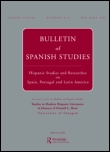
Bulletin of Spanish Studies
Scope & Guideline
Showcasing Peer-Reviewed Research in Spanish Studies
Introduction
Aims and Scopes
- Literary Analysis and Criticism:
The journal emphasizes in-depth literary analysis, exploring both canonical and contemporary texts from Spain and Latin America, engaging with themes of identity, gender, and cultural memory. - Cultural Studies:
Research published in the Bulletin often intersects with cultural studies, examining the socio-political contexts of literary works and their impact on contemporary culture. - Historical Contextualization:
The journal frequently contextualizes literary works within broader historical narratives, such as the Spanish Civil War, colonialism, and censorship, providing a rich backdrop for understanding the texts. - Interdisciplinary Approaches:
The Bulletin encourages interdisciplinary scholarship, blending literature with history, visual arts, and performance studies to enrich the understanding of Spanish and Latin American cultures. - Focus on Marginalized Voices:
There is a growing focus on marginalized voices and perspectives, including gender studies, LGBTQ+ narratives, and postcolonial critiques, reflecting the diversity of the Spanish-speaking world.
Trending and Emerging
- Queer Studies and Gender Theory:
There is an increasing focus on queer studies and gender theory, exploring LGBTQ+ representations and feminist critiques within Spanish and Latin American literature. - Postcolonial and Decolonial Perspectives:
Emerging scholarship frequently engages with postcolonial and decolonial theories, analyzing the legacies of colonialism in literature and culture, and advocating for voices from formerly colonized regions. - Censorship and Freedom of Expression:
Recent publications have highlighted issues of censorship and freedom of expression, particularly in relation to historical and contemporary political regimes, indicating an urgent relevance in today's discourse. - Digital Humanities and New Media:
The journal is increasingly publishing research that intersects with digital humanities and new media, exploring how technology influences literary production and cultural dissemination. - Environmental and Ecocritical Studies:
Emerging themes also include environmental studies and ecocriticism, reflecting a growing awareness of ecological issues within the literary and cultural discourse of the Spanish-speaking world.
Declining or Waning
- Traditional Canonical Texts:
There is a noticeable decline in the focus on traditional canonical texts, such as works by authors like Cervantes and Quevedo, as newer scholarship increasingly prioritizes contemporary literature and diverse voices. - Static Historical Narratives:
Research that adheres strictly to static historical narratives without engaging critically with contemporary implications has decreased, as scholars seek more dynamic and nuanced interpretations. - Exclusive National Focus:
The journal is moving away from an exclusive focus on national literature towards a more transnational and comparative approach, which may indicate a waning interest in strictly nationalistic literary analyses.
Similar Journals

Anuario Calderoniano
Unveiling the Rich Tapestry of Literary TheoryAnuario Calderoniano is a distinguished academic journal published by IBEROAMERICANA EDITORIAL VERVUERT S L, dedicated to the field of literature and literary theory. With an ISSN of 1888-8046 and a notable presence in the academic community, it is recognized for its insightful analyses and contributions to Calderonian studies. The journal has been systematically published from 2013 to 2015 and from 2017 to 2023, consistently examining the works of renowned playwright Pedro Calderón de la Barca and their relevance in contemporary literary discourse. As a Q3 journal in the Literature and Literary Theory category for 2023, it ranks in the 68th percentile among its peers, reflecting its importance and scholarly contribution to the field. While currently not offering open access, the journal remains a crucial resource for researchers, professionals, and students aiming to deepen their understanding of literary narratives and critical perspectives.

Studia Aurea-Revista de Literatura Espanola y Teoria Literaria del Renacimiento y Siglo de Oro
Celebrating the Golden Age of Spanish Literary ThoughtStudia Aurea-Revista de Literatura Espanola y Teoria Literaria del Renacimiento y Siglo de Oro, published by the esteemed Universitat Autònoma de Barcelona, stands as a pivotal academic resource in the fields of Literature and History, specializing in Spanish literature from the Renaissance and the Golden Age. With its Open Access model established since 2007, this journal ensures that groundbreaking research is readily available to scholars and enthusiasts worldwide. Notably recognized for its quality, in 2023 it achieved Q1 rankings in both History and Literature and Literary Theory, reflecting its significant contribution to advancing knowledge in these domains. The journal's Scopus rankings further underscore its impact, placing it in the top 20% for literature and the top 37% for history. As it converges from 2018 to 2023, Studia Aurea continues to facilitate critical discussions, innovative research, and the exploration of literary theories, making it an essential platform for researchers, professionals, and students alike.
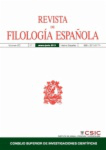
REVISTA DE FILOLOGIA ESPANOLA
Exploring the Depths of Spanish Linguistics and LiteratureREVISTA DE FILOLOGIA ESPANOLA is a distinguished academic journal dedicated to the fields of linguistics and literature, published by the CONSEJO SUPERIOR INVESTIGACIONES CIENTIFICAS (CSIC) since 1954, and has been an Open Access journal since its inception. Situated in Madrid, Spain, this journal has emerged as a crucial platform for the dissemination of scholarly research, with notable rankings including Q2 in Linguistics and Language and Q1 in Literature and Literary Theory as of 2023. The journal's commitment to fostering academic dialogue is reflected in its impressive Scopus rankings, including a 79th percentile in the Arts and Humanities for Literature and Literary Theory. Covering a wide range of topics from linguistic theory to literary critique, REVISTA DE FILOLOGIA ESPANOLA is essential reading for researchers, professionals, and students alike, providing valuable insights and cutting-edge research in the ever-evolving landscape of Spanish philology.
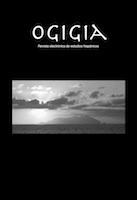
Ogigia-Revista Electronica de Estudios Hispanicos
Exploring the Depths of Hispanic Culture and LanguageOgigia-Revista Electronica de Estudios Hispanicos is a distinguished academic journal published by EDICIONES UNIV VALLADOLID in Spain, focusing on the rich field of Hispanic studies including literature, linguistics, and education. Since it became an Open Access journal in 2013, it has provided a platform for scholars and practitioners to disseminate their research widely, fostering critical engagement and dialogue within the global academic community. As of 2023, the journal holds various category quartiles, reflecting its impact in relevant disciplines—ranked in Q4 in Education, Q3 in Linguistics and Language, and Q2 in Literature and Literary Theory. In the Scopus metrics, it occupies the 54th percentile in Literature and Literary Theory, underscoring its significant contribution to the field. Its core objective is to explore themes pertinent to Hispanic culture and language, providing an essential resource for researchers, educators, and students engaged with the intricacies of Spanish studies.

Anclajes
Empowering Voices in Literature and LinguisticsAnclajes is a prominent academic journal dedicated to the fields of Cultural Studies, Linguistics, and Literature, published by the UNIV NACIONAL LA PAMPA, FAC CIENCIAS HUMANAS. With both print (ISSN 0329-3807) and electronic (E-ISSN 1851-4669) formats, the journal has embraced an Open Access model since 2010, greatly enhancing its accessibility and reach to a global audience. Based in Argentina, Anclajes provides a platform for innovative research and critical discourse, contributing significantly to the understanding of cultural phenomena and literary theories. In recent years, the journal has established itself with a Scopus rank placing it in the top 30% of Literature and Literary Theory and the top 57% of Cultural Studies, as indicated by its quartile rankings for 2023. With issues converging from 2012 to 2024, Anclajes continues to foster scholarly communication and serves as an essential resource for researchers, students, and professionals seeking to explore the dynamism of human culture and expression.

Dicenda-Cuadernos de Filologia Hispanica
Innovating Research in the Heart of Hispanic StudiesDicenda-Cuadernos de Filologia Hispanica, published by UNIV COMPLUTENSE MADRID, SERVICIO PUBLICACIONES, is a distinguished academic journal in the fields of linguistics, literature, and literary theory. Since its transition to Open Access in 2017, it has facilitated unrestricted dissemination of knowledge, making it an invaluable resource for researchers, scholars, and students interested in the rich tapestry of Hispanic philology. With an impact factor reflected by its Scopus rankings—at Q3 in Linguistics and Language and Q2 in Literature and Literary Theory—Dicenda serves as a vital platform for innovative research and critical discourse. The journal actively encourages submissions that explore contemporary and historical perspectives within its scope. Located in Madrid, Spain, the journal has steadily established itself as a significant contributor to the ongoing dialogue in the humanities, fostering a deeper understanding of linguistic and literary phenomena.
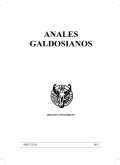
Anales Galdosianos
Challenging Perspectives on Galdós and His EraAnales Galdosianos is a prominent academic journal dedicated to the study of the works and impact of Spanish author Benito Pérez Galdós, providing a platform for innovative research in the field of Spanish literature and culture. Published by the Asoc Int Galdosistas, Inc., this journal serves as a nexus for scholars, students, and professionals interested in critical studies, literary criticism, and historical contexts surrounding Galdós's contributions to literature. Situated within the broader scope of Hispanic Studies, Anales Galdosianos enriches the academic discourse by fostering an understanding of Galdós's influence on narrative forms and social issues during his time. While the journal does not operate under open access, it remains a valuable resource for those engaged in literary research and education. With its commitment to scholarly excellence, Anales Galdosianos continues to uphold Galdós's legacy, inviting submissions that challenge perspectives and deepen our comprehension of this essential figure in Spanish literary history. For further engagement or to submit works, prospective contributors are encouraged to contact Alan E. Smith, Director of the Department of Romance Studies at Boston University.
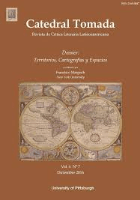
Catedral Tomada-Revista de Critica Literaria Latinoamericana-Journal of Latin American Literary Criticism
Cultivating Critical Insights in Literature and CultureCatedral Tomada - Revista de Crítica Literaria Latinoamericana is a pioneering journal dedicated to the exploration and critique of Latin American literature and its broader cultural implications. Published by the University of Pittsburgh's Library System, this Open Access journal has been instrumental since its launch in 2013 in making scholarly discussions accessible to a wider audience. With an ISSN of 2169-0847, the journal serves as a vital platform for researchers, professionals, and students interested in Literature and Literary Theory, Cultural Studies, and Linguistics and Language. Its esteemed ranking places it in Quartile 1 for Literature and Literary Theory and Quartile 2 for the other categories, underlining its commitment to high-quality academic discourse. Converging insights through a quarterly publication schedule from 2019 to 2024, Catedral Tomada aims to foster a rich dialogue on Latin American literary criticism, encouraging innovative perspectives and diverse voices within the field.

Cahiers de Civilisation Espagnole Contemporaine-De 1808 Au Temps Present
Connecting Past and Present in Spanish ScholarshipCahiers de Civilisation Espagnole Contemporaine-De 1808 Au Temps Present, published by UNIV PARIS X-PARIS-NANTERRE, is a leading academic journal dedicated to the exploration and analysis of contemporary Spanish civilization from 1808 to the present day. With an emphasis on interdisciplinary approaches, this journal serves as a platform for researchers, professionals, and students interested in the cultural, social, political, and historical aspects of Spain's evolution over the centuries. Since adopting an Open Access model in 2007, it has made significant strides in disseminating knowledge, thereby contributing to a broader understanding of Spanish studies in the global academic community. The journal's rigorous peer-review process ensures high-quality scholarship, making it a vital resource for anyone seeking to deepen their expertise in contemporary Spanish issues. Its headquarters are located at 200 Avenue Republique, Nanterre 92001, France, signaling its strong connection to the academic traditions of Paris and its commitment to fostering scholarly discourse.
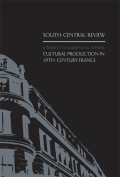
South Central Review
Unveiling the Depths of Cultural Studies and PhilosophySouth Central Review, a distinguished academic journal published by Johns Hopkins University Press, serves as a vital platform for scholarly discourse in the fields of cultural studies, literature and literary theory, philosophy, and the visual and performing arts. With an ISSN of 0743-6831 and an E-ISSN of 1549-3377, this journal is dedicated to highlighting innovative research and critical analyses that explore the complexities of Southern culture and its broader implications. Although it operates without an open access option, the journal is recognized for its rigorous peer-review process and contributions to contemporary academic dialogue, holding Q3 and Q4 rankings across several disciplines as of 2023. The convergence of ideas and perspectives from diverse academic backgrounds positions the South Central Review as an essential resource for researchers, professionals, and students seeking to deepen their understanding of the cultural narratives shaping our world today.